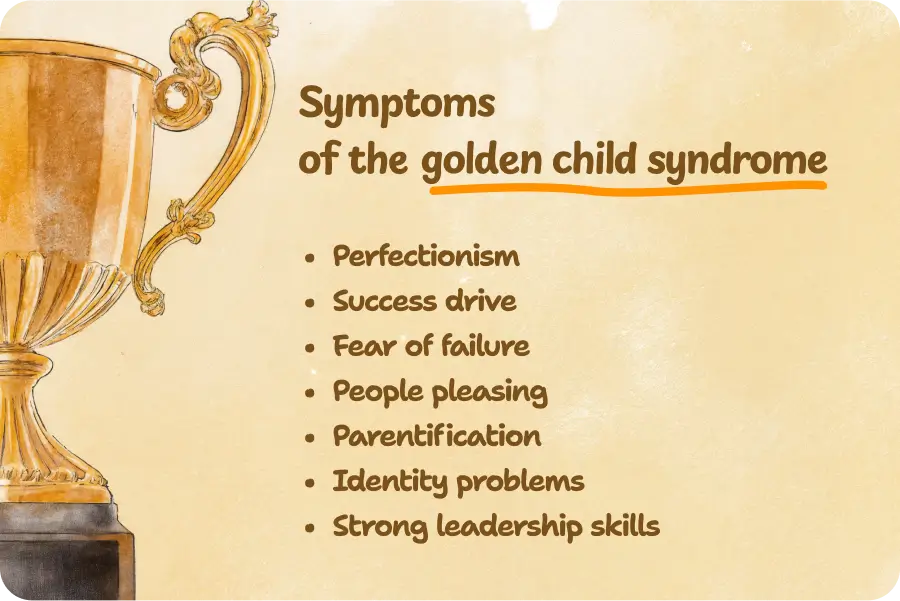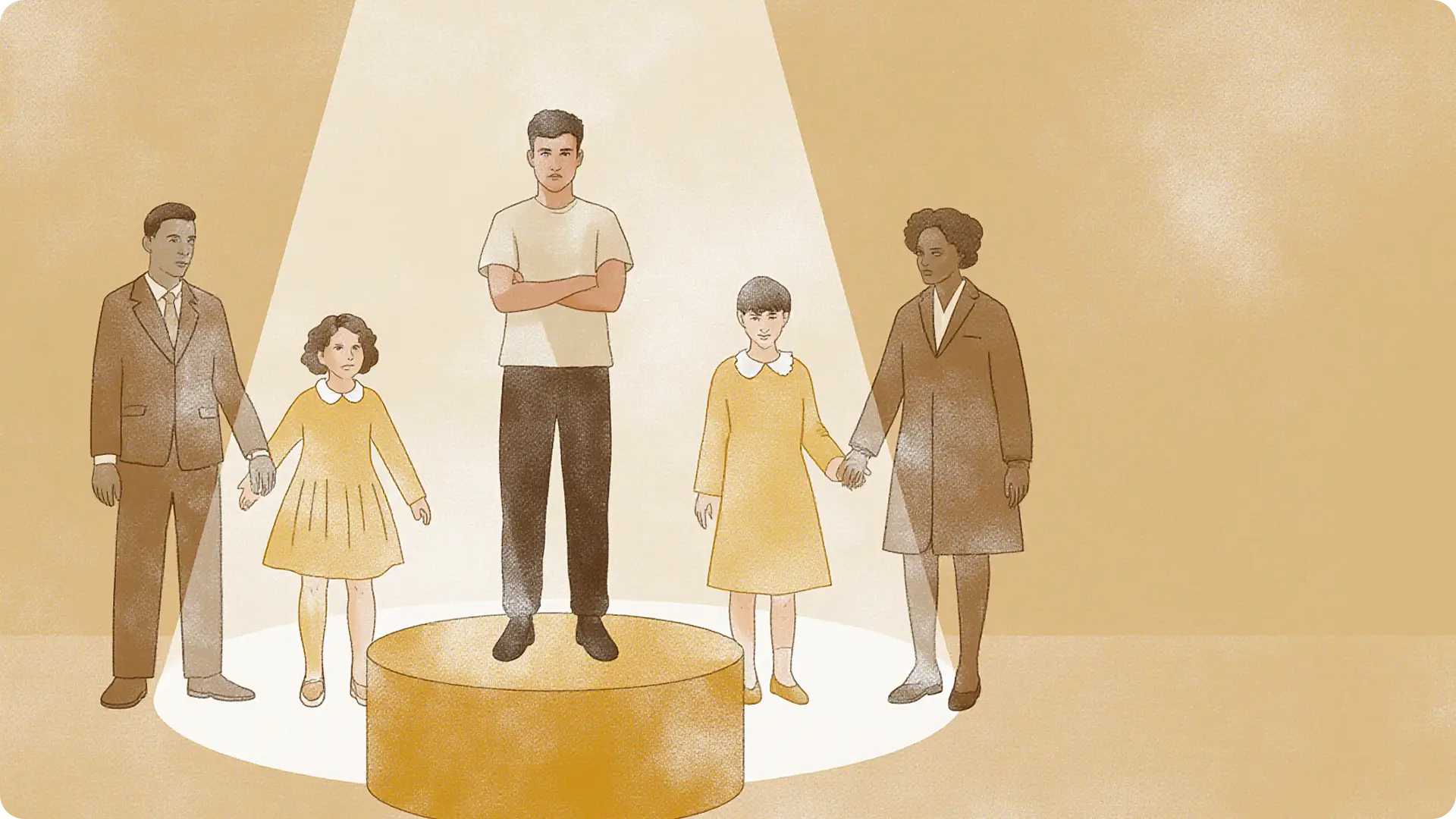Your parents always treated you differently from your siblings. You were “the best one,” “the most clever one,” and “the most loved one.” Even if they didn’t say that directly, you felt that unstated contrast in parental expectations. It might feel like your parents love you more. And it could also feel like they expect you to carry the weight of unrealistic ambitions.
Let’s learn about the golden child syndrome, how it can affect your adult life, and how to deal with the immense pressure it may cause.
Golden child: meaning of syndrome
Golden child syndrome is a psychological phenomenon that arises from an unhealthy family dynamic when parents show special favor, praise, and attention to one child while also putting excessive pressure on the child to always be exceptional.
This isn’t an official medical term you will find in The Diagnostic and Statistical Manual of Mental Disorders (DSM-5) or any other recognized psychological manual. However, this concept lays the groundwork for understanding some kind of traumatizing experience.
Here’s what a golden child might experience as well:
- high expectations of the child’s success
- fear of making a mistake
- the need to be perfect
- a responsibility to be an example for the golden child’s siblings
Parents see a chosen child as someone who can’t go wrong. They don’t blame this kid for mistakes, forgive any faults, and give the benefit of the doubt for anything. These lofty expectations and favoritism might make children feel empty and lost in life. Later on, the constant drive to “achieve more and more” may lead to burnout with no place to resolve it.
At the same time, another sibling (the one who isn’t the golden child) is neglected, overshadowed, and guilty of everything. They can feel like a scapegoat, guilty for any problem in the whole family. Sooner or later, both the golden child and their siblings may start disliking each other.
If there are more than 2 children in a family, other kids might also become scapegoats, but they can also feel completely alone. Abandoned by parents who pay attention to other children, they may grow up without any emotional response, whether positive or negative.
Symptoms of the golden child syndrome
A golden child dynamic and immense pressure at a young age can lead to long-lasting psychological consequences. Here are some of the most common:
1. Perfectionism
Perfectionism can drive you to chase A grades in university and aim for the highest salary among your peers. You may always strive to win every argument or set unrealistically high standards for appearance.
A golden child may believe that everything needs to be perfect. And if they find a stain on the shirt they’ve been wearing all day, it will feel worse than a nightmare.
Think about Princess Azula from “Avatar: The Last Airbender.” As a favored child in a royal family, she was expected to outshine her brother, Zuko.
This pressure drove her to be ruthless, obsess over power, and relentlessly hone her skills to meet parental expectations. Nevertheless, this relentless pursuit of perfection masked deeper insecurities and fears of failure. This is a perfect example of how golden child syndrome can manifest in adulthood.
2. Success drive
While there’s nothing wrong with striving to reach your goals, a golden child may do this to prove to themselves that they are important. “Look at me. I meet and exceed your expectations,” — this is how it may feel.
The influence of such a mother wound/father wound can weaken in childhood and become more powerful later. In adulthood, there are no parents who constantly praise you. So, people with good child syndrome can chase likes on social media, obsess over their bodies, and seek validation through career growth.
Expert Insight
“While it is crucial for children to receive praise, approval, and acknowledgment from their caregivers, the negative side effects of unrealistically high expectations and pressures to succeed can create long-term challenges for an individual’s mental health.”
Hannah Schlueter
Mental health professional
3. Fear of failure
Feeling “not good enough” runs like a common thread throughout the entire lives of the favored children. And to prove their goodness, they tend to overwork in order not to lose affection. Making parents happy and satisfied is the primary goal of their lives, and a golden child may carry this emotional baggage, paired with anxiety and fear of rejection, into adulthood.
Here’s how a Reddit user describes growing up with an inflated sense of self-worth: “After being on that pedestal for a while, I internalized the idea that I’m not allowed to have anything ‘wrong’ with me.”
4. People pleasing
In a parent’s eyes, a golden child is a kid who’s always cheerful, successful, and ready to help. And if you don’t fit this role, parents get upset. While golden children are incredibly scared to disappoint their closest people, they will do their best to feel valuable.
Such people project their need for recognition and approval on everyone around them, which leads them to go to great lengths to please friends, colleagues, and even strangers. They may take on extra work, avoid conflict at all costs, and consistently prioritize others’ needs over their own, all to maintain their status as the “golden child.” This relentless people-pleasing can be exhausting and detrimental to their well-being.
5. Parentification
A golden child syndrome isn’t only about high expectations but also about a huge amount of work. As parents want their kids to achieve more and more, they can blame them for rest and “childish” activities.
“You can’t play with dolls even though you’re 4. We need to be in the musical school / sports section / mathematics class in 20 minutes.”
This is how it can feel. Even more, some people can force golden children to make their unfulfilled dreams come true, leaving them without the freedom to explore their paths and desires. And living in a constant rush to achieve, golden kids grow up much faster.
Later on, some parents can expect them to raise their siblings, find jobs at a young age, do most housework, and much more. As a result, such a parentified child becomes the most mature person among all family members.

6. Identity problems
One of the most severe outcomes of being the golden child is having little sense of self and one’s own identity. From the day of birth, you might have lived the child’s life your parents expected you to live and did what made your parents happy.
People with golden child syndrome find it difficult to live without clear direction from others. They may struggle to identify their needs and goals because their parents’ expectations overshadow their self-worth.
Consequently, even if such adults find something they want to do, their desires might feel uncertain. They may second-guess their choices, wondering if they are truly their own or just another way to gain approval through their accomplishments.
7. Strong leadership skills
People with golden child syndrome can be leaders in adulthood. They may develop exceptional communication skills and be smart and resourceful, with impressive charisma and hobbies. This can make golden children leaders of the group, particularly in their teen years and young adulthood.
Let’s remember Thor from the Marvel Cinematic Universe. As the favored son of Odin, the Allfather, he grew up to become the next king of Asgard. These high expectations pushed Thor to develop leadership skills, including bravery, strategic thinking, and the ability to inspire everyone around him.
Mental health issues that might stem from a golden child syndrome
There’s no specific research tailored to the challenges of golden children. Nevertheless, living in such unhealthy family dynamics, many kids might develop childhood trauma. Thus, we’ll focus on the long-lasting effects of the golden child syndrome from the perspective of how trauma can influence well-being.
1. Anxiety and depression
Regular childhood stress from the lack of emotional support and high expectations can overactivate the body’s stress response system, keeping it on high alert. This can lead to permanently heightened cortisol levels that increase the risk of anxiety and depression. [1]
2. Sleep disturbance
Studies prove that adolescents with childhood trauma can experience shorter sleep duration, difficulty falling asleep, frequent awakenings, nightmares, sleepless nights, and early-morning wakefulness. [2] In the case of people living with golden child syndrome, this might stem from constant pressure to meet expectations and fear of failure, which makes it hard to relax.
3. Substance abuse
It may be challenging for golden children to handle their own emotions, especially in a world where others no longer provide special treatment to them. As such, they might turn to substances like alcohol or drugs to cope with stress, anxiety, or feelings of inadequacy.
4. Denial
Golden children receive preferential treatment for “being perfect” in the eyes of other family members. They might feel like they aren’t allowed to show real emotions or vulnerabilities. In adulthood, these adults may deny their real feelings or refuse to acknowledge mistakes, which can prevent them from processing difficult emotions.
5. Self-isolation
Studies have found that there’s some kind of association between childhood trauma and increased social exclusion. [3] People with the golden child syndrome may find it challenging to find a common language with others, build healthy romantic relationships, or trust others to protect themselves from vulnerability.
What happens when a golden child fails?
For people with the golden child syndrome, it may be extremely difficult to accept failure. They grew up believing that they’re the best and trying to succeed in all spheres of life. Their self-worth depends on how perfectly they perform.
If a golden child fails, it can cause feelings of inadequacy and shame or even result in low self-esteem. Every mistake can shake their whole identity and make them question their value as a person.
For example, if someone who used to be a golden child gets fired from work because of weak performance, they may experience an overwhelming sense of humiliation. Instead of approaching it as a setback and learning opportunity, they might isolate themselves, try to change their career entirely, or excessively overwork at the next job to prove their worth.
Have you ever felt like a favored child in your family?
Family dynamics that influence the development of a golden child psychology
Most often, kids develop golden child syndrome under narcissistic parentification. In a controlling and autocratic parent-child relationship, older relatives can enforce favoritism to satisfy their wishes. In such a narcissistic family system, adults might pay little attention to their kids’ well-being but rather to their status and ego.
In the aftermath, children of narcissistic parents become so-called “projections” of their parents’ self-image. While a golden child turns out to be a good part of self-image, a scapegoat becomes a bad part. Interestingly, these projections have nothing in common with real kids’ traits.
For daughters of narcissistic mothers, this can mean feeling intense pressure to be flawless. They might strive to meet unrealistically high standards, seeking approval and validation. Moreover, golden children have no right to go against the rules, as the narcissistic parent will immediately “stop loving them.” While it can sound mind-blowing, for kids growing up with attachment issues, this is an everyday reality.
What’s the link between the golden child role and developing narcissistic traits?
It’s a two-edged sword. Some kids can grow up with narcissistic traits, mirroring the behaviors of their parents. Nonetheless, others may struggle with conflicting emotions or strive to redefine their sense of self-worth.
There’s no single accurate predictor of whether a particular golden child will become a narcissist. It can depend on a combination of factors.
A child may grow with inflated self-esteem. When parents excessively praise and favor their kids, seeing them as exceptionally talented or deserving, the children can develop a strong sense of entitlement. Such people live in a paradigm that they are perfect, better than their siblings, and generally good at everything.
On the contrary, adults with golden child syndrome and low self-esteem are also common. For instance, because of unrealistic expectations of their parents, they can become too critical of themselves and start feeling that they’re “never enough.”
According to DSM-5, in most cases, people with narcissistic personality disorder (NPD) have fragile self-esteem. So even if they seem confident or superior, such people may depend on praise and success to feel good about themselves. For some former golden children, this comes from growing up with love that felt conditional. Others become aware of this pattern and learn to build real confidence that doesn’t rely on others’ approval.
Hannah Schlueter, MA, LAC, adds, “Patterns of perfectionism rely on the interpretation of mistakes and fear of failure, resulting in a vicious cycle that impacts one’s identity, relationships, and emotional intelligence. Addressing these issues often requires additional help from a professional as you begin to unlearn the harmful patterns to create a more flexible and self-compassionate way of thinking.”
Golden child syndrome test
Approach this test as a tool to help you gain insight into your experiences and behaviors, not as an official mental health examination. For a professional assessment, consider consulting with a therapist.
Answer “yes” or “no” to all the questions. Then, calculate the “yes” answers.
- Did you receive more attention and love than your siblings?
- Did your parents compare your siblings to you, highlighting how well you did?
- Did you feel like you had to live up to a high standard set by your parents?
- Did your siblings often take the blame for family issues or conflicts?
- Did your parents perceive your mistakes as if they were no big deal?
- Were you the “golden example” your parents wanted your siblings to follow?
- Did your parents tell you how special and unique you were compared to everyone else?
- Did you feel a constant need to succeed to make your parents proud?
- Did you feel like your parents’ happiness depended on how well you did?
- Is it tough for you to handle criticism or failure?
- Did you feel pressure or guilt when you didn’t meet your parents’ expectations?
- Were you often the one trying to keep the peace during family conflicts?
Results of a golden child syndrome test
- 0-2 “yes.” Most likely, you weren’t a golden child in your family. Probably, you didn’t feel an overwhelming need to be perfect or the constant weight of your parents’ expectations.
- 3-6 “yes.” You might have experienced some elements of being the golden child. Thus, now you may feel some lingering effects of favoritism. It’s important to recognize these feelings and work towards understanding how they shape your current behavior and relationships.
- 7-12 “yes.” You likely grew up with the golden child syndrome. You might feel immense pressure to be exceptional, which could have led to a deep-seated fear of failure and a significant impact on your self-esteem.
How to heal from golden child syndrome: overcoming the emotional burden
To heal from a syndrome, many golden children may need to develop coping mechanisms that help them manage perfectionism, fear of failure, and people-pleasing tendencies. These are some of the tips that might be helpful.
1. Acknowledge unrealistic expectations and thought patterns you live with
Analyze your past experience and think about situations when you felt like a favored child only when you achieved something. Once you accept that this happened to you and you might have developed golden child syndrome, focus on the disturbing beliefs you might have carried into adulthood. Here are some of the common ones:
- “People will love me only when I’m perfect.”
- “If I make a mistake, I am a failure.”
- “I am responsible for other people’s happiness.”
- “If I am not in control, things will go wrong.”
- “Asking for help is a sign of weakness.”
You can write these thoughts down and turn to them regularly to start noticing these negative beliefs in daily situations.
2. Stop seeking external validation
It might be challenging in the beginning, but your goal should be to build a healthy sense of self. Think about your core values and the dreams you want to pursue. Try to do things that you like instead of those that you think might impress others.
You can also do a simple practice to establish a stable self-esteem. Every day, list a few things you think you did well. It might be something small, like completing a task on time, speaking up in a meeting, or being kind to someone. After some time, you will be able to see your strengths more clearly without relying on others’ praise.
3. Set healthy boundaries with family members
If family dynamics are still far from being perfect, it may be reasonable to distance yourself from toxic relatives. Here’s what can help you do it:
- Communicate your point clearly. Once you understand what you can and can’t tolerate, talk about it with other family members. Stay calm and assertive even if someone tries to provoke you.
- Stay consistent. Your family may try to test your limits or make you feel guilty. In this case, increase the distance and say out loud that you won’t let them foster feelings of inadequacy.
- If nothing seems to help, limit communication. External validation, especially from loved ones, may be rather pleasant. But if your parents keep seeing you only as a person who constantly has to achieve or please, it’s a sign that the relationship isn’t emotionally safe. It may be better for you to limit communication and see or talk to them more rarely.
4. Learn to recognize your own needs, desires, and emotions
Understanding your experiences and the way they influence your present can be the first step toward finding your path. Try the Breeze app, as it can become an all-in-one helping tool on your journey to healing.
- Journaling and mood tracking will help you spot narcissistic tendencies and patterns connected to golden child syndrome (like perfectionism or fear of failure). Even more, they can help you find out what you really want and need, separate from others’ expectations.
- Self-discovery tests are perfect for developing a stronger sense of self. You can find out your real values, priorities, and needs, and how they differ from those that were imposed on you. Tailored insights will help you develop a healthier relationship with yourself and reach personal growth.
5. Try family therapy or reach out to a mental health professional
In case your relatives are ready for change, you can try family therapy. Most probably, people with narcissistic tendencies won’t agree to that, but if you want to improve sibling relationships or foster a connection with other family members, therapy can create a safe space to express feelings.
If creating a supportive family environment is impossible, a licensed professional counselor will help you overcome past patterns. They can provide emotional support, guide you to overcome low self-esteem, and acknowledge your needs and boundaries.
Frequently asked questions
What is the difference between the golden child and the scapegoat?
The golden child gets special treatment and can be seen as the favored child in the family. At the same time, such kids constantly face and need to meet extremely high parental expectations.
A scapegoat is usually blamed for family problems. In toxic family dynamics, such children are criticized or labeled as the “problem” child, regardless of their behavior. While the golden child may be idealized, the scapegoat is typically neglected.
Can a golden child become a narcissist?
Yes, someone with the golden child syndrome can become a narcissist if they inherit their parents’ traits or mirror certain behaviors. However, some golden children can have narcissistic trauma that manifests as having low self-esteem and deep insecurity instead.
How do you know if you were the golden child?
You were a golden child if you experienced unrealistic expectations, parental favoritism, and significant emotional distress because of the constant pressure to succeed. You might have felt loved only when you achieved something.
Can you heal from the emotional toll of golden child syndrome as an adult?
Yes, healing is possible. You can learn to acknowledge your self-worth without the need to receive approval from controlling and overly demanding parents or other important figures. Also, through self-reflection and therapeutic support, a former golden child may learn to build balanced relationships and value authenticity over perfection.
Sources
- Cheyenne Downey, Aoife Crummy. “The impact of childhood trauma on children’s wellbeing and adult behavior.” European Journal of Trauma & Dissociation. 2022
- Giannakopoulos G, Kolaitis G. “Sleep problems in children and adolescents following traumatic life events.” World J Psychiatry. 2021
- Allen SF, Gilbody S, Atkin K, van der Feltz-Cornelis CM. “The associations among childhood trauma, loneliness, mental health symptoms, and indicators of social exclusion in adulthood: A UK Biobank study.” Brain Behav. 2023
Disclaimer
This article is for general informative and self-discovery purposes only. It should not replace expert guidance from professionals.
Any action you take in response to the information in this article, whether directly or indirectly, is solely your responsibility and is done at your own risk. Breeze content team and its mental health experts disclaim any liability, loss, or risk, personal, professional, or otherwise, which may result from the use and/or application of any content.
Always consult your doctor or other certified health practitioner with any medical questions or concerns
Breeze articles exclusively cite trusted sources, such as academic research institutions and medical associations, including research and studies from PubMed, ResearchGate, or similar databases. Examine our subject-matter editors and editorial process to see how we verify facts and maintain the accuracy, reliability, and trustworthiness of our material.
Was this article helpful?








